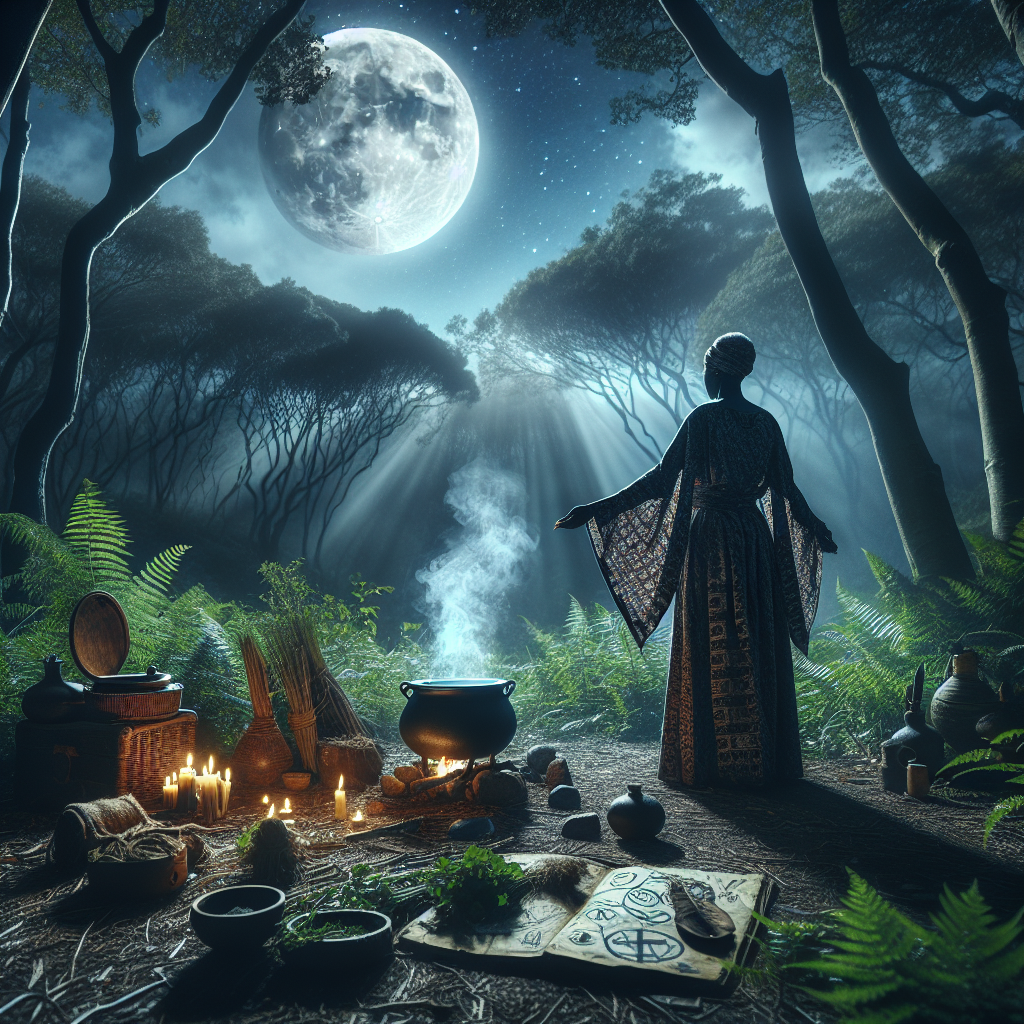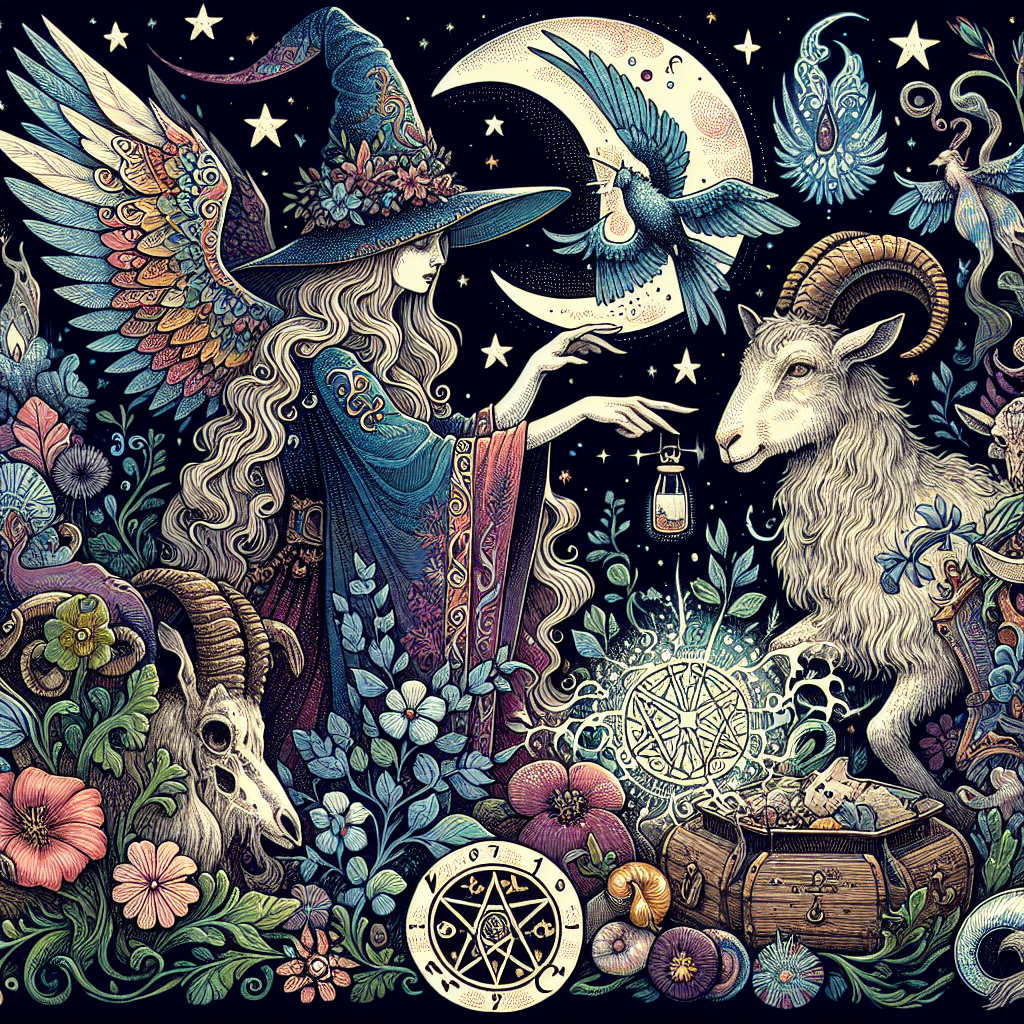As an Amazon Associate I earn from qualifying purchases.
Witchcraft, often characterized as the practice of magic and spellcasting by individuals known as witches, has fascinated and gripped cultures for centuries. Defined as the use of supernatural powers to influence or predict events, witchcraft has a long and complex history that spans across continents. From its historical roots to the modern practices, the discussion surrounding witchcraft remains relevant today due to its cultural impact and persistent influence.
Witchcraft finds its origins in ancient civilizations, with beliefs and practices dating back thousands of years. In ancient Egypt, for example, witchcraft was closely tied to the worship of the goddess Isis, who was believed to possess cosmic powers and the ability to perform miracles. Similarly, in ancient Greece, the witchcraft traditions were associated with goddesses like Hecate and Circe. Throughout history, the perception and understanding of witchcraft have evolved, with cultural and religious influences shaping its various forms and practices.
During the Middle Ages, Europe witnessed a significant rise in witchcraft trials and persecutions, particularly between the 15th and 18th centuries. These trials were fueled by societal anxieties and fears of witchcraft's perceived threat to the established order. It is estimated that between 40,000 to 60,000 people, predominantly women, were executed during this period. While these trials reflected a darker chapter in history, they also demonstrate the enduring power and cultural significance of the subject of witchcraft.
Today, witchcraft has taken on a different, more inclusive form. Modern witches, also known as Wiccans, practice a nature-based spiritual faith that pays homage to ancient traditions and beliefs. Wicca, as it is commonly known, emphasizes a connection to nature, the worship of a goddess and god, and the practice of rituals to harness energy and manifest desires. With a resurgence of interest in spirituality and alternative practices, Wicca has attracted a growing number of adherents around the world.
A compelling statistic that highlights the significance of the topic is the estimated number of witches worldwide. According to a study conducted in 2014, approximately one to two million people in the United States alone identified as practicing witches, making witchcraft one of the fastest-growing religious or spiritual affiliations. This substantiates the relevance of discussing witchcraft, as it continues to capture the curiosity and engagement of a considerable portion of the population.
The discussion of witchcraft from its historical roots to modern practices remains essential for understanding its cultural and historical significance. By examining the enduring influence of witchcraft throughout centuries, we gain insights into the fears, beliefs, and societal dynamics that have shaped our civilization. Moreover, exploring the current manifestation of witchcraft in the modern world allows us to better comprehend the evolving spiritual landscape and the diverse beliefs and practices that exist today. Ultimately, discussing witchcraft provides a unique lens through which we can understand the human experience and the enduring power of ancient traditions.
What are the Historical Roots and Modern Practices of Witchcraft?
Witchcraft refers to the practice of magic and sorcery, often associated with religious or spiritual beliefs. It has a long and complex history, dating back to ancient civilizations. From pagan rituals to the witch trials of the medieval period, understanding the historical roots of witchcraft sheds light on its significance today. Moreover, modern practices of witchcraft have evolved to encompass a wide range of traditions and beliefs. In the following sections, we will delve into the rich historical background of witchcraft and explore its contemporary manifestations in greater detail.
Diving into the historical roots of witchcraft, it is evident that the practice has a long and complex history. Witchcraft has been a part of human cultures for centuries, with its origins reaching back to prehistoric times. The concept of witchcraft varies across different cultures and time periods, but there are recurring themes and beliefs that have shaped its evolution over time.
In ancient civilizations, witchcraft was often associated with religious beliefs and rituals. In many early cultures, such as the ancient Egyptians and Greeks, witches were believed to have the power to communicate with the gods and manipulate natural forces. They were seen as both revered and feared figures, capable of mediating between the spiritual and earthly realms.
During the medieval period, witchcraft took a dark turn. It became associated with evil and was deemed heretical by the Christian Church. The infamous witch trials, especially the witch trials of the 16th and 17th centuries, saw thousands of people accused of practicing witchcraft and facing persecution, torture, and even death. The fear and paranoia surrounding witchcraft during this time led to widespread hysteria and the belief in witches as malevolent entities in collusion with the devil.
In more recent history, witchcraft has experienced a resurgence in popularity, particularly in Western cultures. The modern practice of witchcraft, often referred to as Wicca, emerged in the mid-20th century and is characterized by a focus on nature worship, reverence for the divine feminine, and the use of spells and rituals for personal empowerment and spiritual growth.
Today, witchcraft is a diverse and multifaceted phenomenon. It encompasses various traditions, beliefs, and practices, ranging from traditional witchcraft to neo-paganism and eclectic witchcraft. Many modern witches draw inspiration from ancient folklore, mythology, and spiritual traditions, while others incorporate elements of psychology, self-help, and herbalism into their practice.
According to a survey conducted by the Pew Research Center in 2014, approximately 0.4% of the adult population in the United States identify as Wiccan or pagan, which translates to roughly 1 to 1.5 million people. This statistic highlights the significant number of individuals who have embraced witchcraft and neo-pagan beliefs in modern society.
In conclusion, witchcraft has a rich and diverse history, rooted in ancient civilizations and shaped by socio-cultural factors throughout the ages. From its spiritual and religious origins to its modern-day resurgence, witchcraft continues to captivate the imagination and provide a source of empowerment and spiritual connection for many individuals today.
Frequently Asked Questions – Discussing Witchcraft: From Historical Roots to Modern Practices
1. What is witchcraft?
Witchcraft is a practice that involves the use of magical abilities, ritualistic practices, and supernatural powers to affect and influence the world around us. It encompasses various belief systems, traditions, and practices that have existed across different cultures and times.
2. Is witchcraft a religion?
Witchcraft itself is not a religion, but rather a practice or craft that can be incorporated into various belief systems. Some individuals may practice witchcraft within the context of a specific religion, such as Wicca or Paganism, while others may practice it as a standalone spiritual or magical practice.
3. What is the historical significance of witchcraft?
Throughout history, witchcraft has been both feared and revered. In ancient times, witches were often revered as healers, midwives, and wise women. However, during the European witch hunts of the 15th to 18th centuries, witchcraft was associated with evil and many innocent people were persecuted and even executed for supposed witchcraft.
4. Are witches real?
The concept of witches is subjective and varies depending on one's beliefs. Some people believe in the existence of witches as individuals who possess magical abilities or powers, while others perceive witches as symbolic figures or archetypes within mythology, folklore, and literature.
5. What are modern practices of witchcraft?
Modern practices of witchcraft encompass a wide range of beliefs and practices. Some common elements include spellwork, divination, herbalism, energy manipulation, ritualistic ceremonies, and connecting with nature. These practices can vary greatly from person to person, depending on their personal beliefs and traditions.
6. Is witchcraft associated with devil worship?
No, witchcraft is not inherently associated with devil worship. The belief that witches worship the devil originated during the European witch hunts and was largely a result of religious and societal fears. In reality, modern witchcraft encompasses a diverse range of beliefs, and devil worship is not a fundamental aspect.
7. Can anyone practice witchcraft?
Yes, anyone can practice witchcraft if they have an interest and dedication to learning its practices. The practice of witchcraft is not limited by gender, age, or background. It is important, however, to respect cultural practices and traditions that may be tied to specific belief systems.
8. Do witches cast spells?
Yes, spellcasting is a common practice in witchcraft. Spells are often used as tools to manifest intentions and desires, promote healing, provide protection, or seek guidance. It is essential to note that witchcraft emphasizes ethical considerations, such as the Wiccan Rede, which encourages practitioners to harm none.
9. Are there any risks associated with practicing witchcraft?
Like any spiritual or magical practice, there can be risks associated with witchcraft if not approached with caution and respect. It is important to have a thorough understanding of the practices, to consider the potential consequences, and to ensure the well-being and consent of all involved.
10. How can one begin practicing witchcraft?
Starting to practice witchcraft often involves research, self-reflection, and exploration. It is advisable to read books, join community groups, and seek guidance from experienced practitioners who can provide valuable insights and advice. Remember to approach it with an open mind and respect for different beliefs and traditions.

Conclusion
In conclusion, this article has shed light on the historical roots and modern practices of witchcraft. We have explored the origins of witchcraft, dating back to ancient civilizations such as Mesopotamia and Egypt, and how it evolved over time to include various cultural and religious influences. The persecution and trials of witches during the European witch-hunts were also discussed, highlighting the immense suffering and injustice faced by those accused.
Furthermore, we delved into the modern practices of witchcraft and how it has found a place in contemporary society. The resurgence of interest in witchcraft has led to the formation of numerous traditions and paths, each with its own rituals, beliefs, and spellwork. We learned that modern witches often embrace nature, spirituality, and personal empowerment, emphasizing self-care and connection with the divine.
Importantly, throughout this article, we emphasized that witchcraft is a diverse and multifaceted belief system, often misunderstood and misrepresented. It is not inherently evil or demonic, as popular culture often portrays, but rather a deeply personal and sacred practice for many. We must approach witchcraft with an open mind and respect for the diversity within its practitioners.
In conclusion, studying the historical roots and modern practices of witchcraft provides us with a fascinating insight into humanity's enduring fascination with the mystical and the unknown. By examining these traditions, we gain a deeper understanding of different cultural practices and the importance of embracing diverse belief systems. Whether one chooses to practice witchcraft or simply seeks knowledge, it is essential to approach the subject with curiosity, empathy, and a commitment to dispelling stereotypes.
Amazon and the Amazon logo are trademarks of Amazon.com, Inc, or its affiliates.


